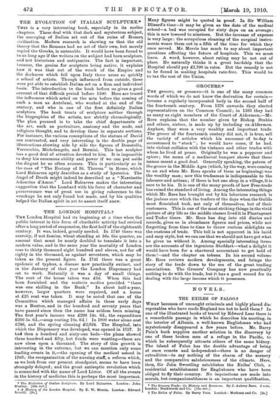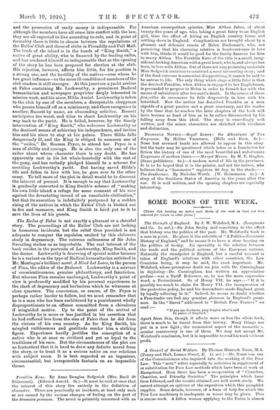NOVELS.
THE EXILES OF FALOO.t WHAT becomes of uncaught criminals and highly placed dis.; reputables who have made England too hot to hold them P In one of the illustrated books of travel by Edward Lear there is a remarkable passage in which he describes his meeting, in the interior of Albania, a well-known Englishman who had mysteriously disappeared a few years before. Mr. Barry Pain's book supplies another solution in the discovery by one of these broken men of a refuge in the Pacific, to which he subsequently attracts others of the same kidney. The island of Faloo has the double advantage of being at once remote and independent—there is no danger of extradition—to say nothing of the charm -of - the scenery and the comparative salubriousness of the climate. Here, then, Sir Sohn Sweetling establishes the Exiles' Club, a residential establishment for Englishmen who have been obliged to fly their country. No inquisitions are made into morals, but companionableness is an important qualification,
• The Grocery Trade : its History and Romance. By J. Aubrey Bees. 2 vols. London; Duckworth and Co. [21e. net.]
.
t The Exiles of Falco. By Barry Pain. London : Methuen and Co. [Gs.] and the possession of ready money is indispensable. For although the members have all come into conflict with the law, they are all expected to live according to rule, and in point of formality there is little to choose between the regulations of the Exiles' Club and those of clubs in Piccadilly and Pall Mall. The trade of the island is in the hands of "•King Smith," a native of great ability, who is financed by the leading exiles, and has rendered himself so indispensable that at the opening of the story he has been proposed for election at the club. His rejection, however, affects him little, for his position is a strong one, and the hostility of the natives—over whom he has great influence—to the more ill-conditioned members of the club renders it still stronger. At this juncture a yacht arrives at Faloo containing Mr. Lechworthy, a prominent Radical humanitarian and newspaper proprietor deeply interested in mission work, and his niece, Hilda, Auriol. Lechworthy is taken to the club by one of the members, a disreputable clergyman who passes himself off as a missionary, and there recognises in another, Bassett by name, an absconding solicitor. Bassett anticipates the worst, and tries to shoot Lechworthy on his way back to the yacht. He is foiled, however, by the timely intervention of "King Smith," who welcomes Lechworthy as the destined means of achieving his independence, and invites him and his niece to stay at his palace. There Hilda falls dangerously ill, and the King is obliged to summon one of the "exiles," Dr. Soames Pryce, to attend her. Pryce is a man of ability and courage. He is also the only one of the exiles about whose character there is any doubt. He has apparently cast in his lot whole-heartedly with the rest of the gang, and has verbally pledged himself to a scheme for scuttling Lechworthy's yacht. But having saved Hilda's life and fallen in love with her, he goes over to the other camp. To tell more of the plot in detail would be to discount the interest of perusal. It is enough to say that Lechworthy is gradually converted to King Smith's scheme of " making his own little island a refuge for some remnant of his race against the devastating inroad of an unsuitable civilisation," but that its execution is indefinitely postponed by a sudden rising of the natives in which the Exiles' Club is blotted out in fire and massacre, and King Smith is hard put to it to save the lives of his guests.
The Exiles of Faloo is not exactly a pleasant or a cheerful story. The proceedings of the Exiles' Club are not lacking in humorous incidents, but the relief thus provided is not adequate to conquer the repulsion excited by this elaborate study in degeneracy. The extreme callousness of Si John Sweetling strikes us as improbable. The real interest of the book resides in the portraits of Lechworthy, King Smith, and the doctor. Lechworthy is deserving of special notice because he is a variant on the type of Radical humanitarian satirised in Mr. Montague's brilliant novel, A Hind Let Loose, in the person of Pinn, the editor of the Stalwart. Lechworthy is a mixture of conscientiousness, genuine philanthropy, and fanaticism. But whereas Finn remains unchanged, Lechworthy's point of view is profoundly modified by his personal experiences in the clash of degeneracy and barbarism which he witnesses at close quarters. The conversion, or rescue, of Dr. Pryce is perhaps rather harder to follow, but we must remember that he is a man who has been embittered by a punishment wholly disproportionate to an offence committed from a chivalrous if misguided motive. Up to the point of the arrival of Lechworthy he is more or less justified in his assertion that he had suffered less from the sins of Faloo than he did from the virtues of his own country. As for King Smith, his mingled ruthlessness and gratitude render him a striking figure. Experience hardly justifies the conception of a native who is at once so civilised and yet so loyal to the traditions of his race. But the circumstances of the plot are so fantastical that it is hard to draw any definite moral from the story, or to treat it as a serious satire on our relations with subject races. It is best regarded as an ingenious, circumstantial, but irresponsible fantasia on an impossible theme.











































 Previous page
Previous page